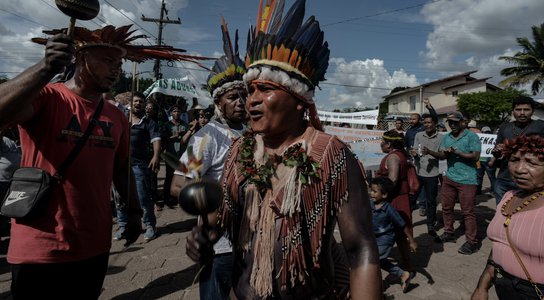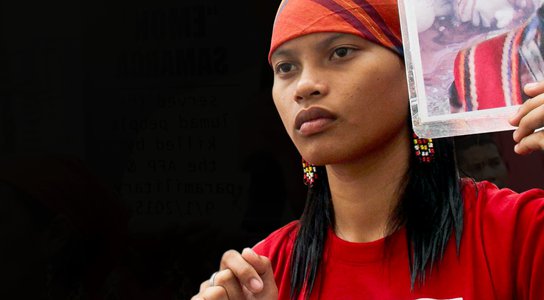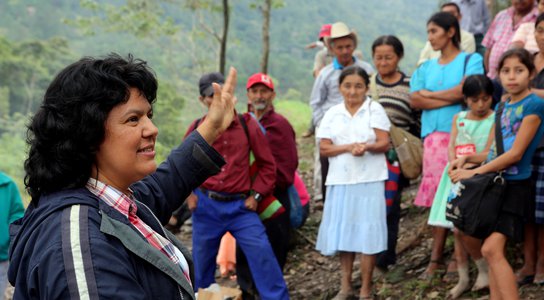United States must urgently review its support of Honduran industry, military and police
A new Global Witness investigation has named the president of Honduras’ ruling party, Gladis Aurora López, as one of several top politicians and business tycoons implicated in a violent crackdown on families standing against the theft and destruction of their land.
The United States also comes under scrutiny for backing Honduran state forces, which are often behind the murders and attacks of activists.
Honduras is the deadliest country in the world to be a land or environmental defender, according to Global Witness research. Over 120 people have been killed since 2010 for protesting against the theft or destruction of their land, forests or rivers, including high-profile indigenous activist Berta Cáceres, whose murder last year was the first to prompt international outrage. (1)
Conflicts over mining, hydropower and agribusiness are the biggest drivers of deaths, with most victims from indigenous groups and rural communities. Global Witness has uncovered new evidence of the back-door deals, bribes and lawbreaking used to impose these projects and silence opposition.
“Our investigations reveal how Honduras’ political and business elites are using corrupt and criminal means to cash in on the country’s natural wealth, and are enlisting the support of state forces to murder and terrorise the communities who dare to stand in their way,” said Global Witness campaign leader Billy Kyte.
“We have documented countless chilling attacks and threats, including the savage beating by soldiers of pregnant women, children held at gunpoint by police, arson attacks on villagers’ homes, and hired assassins who still wander free among their victims’ communities,” said Kyte.
These crimes are being met with chronic levels of impunity. On rare occasions the triggermen are arrested, but those who contract them are almost never punished.
Gladis Aurora López is one of a number of wealthy and influential individuals who is linked to this violence. (2) Documents leaked to Global Witness reveal that the planned Los Encinos hydropower project in the west of the country is controlled by López’s husband, who aims to sell energy to the state despite the clear, and illegal, conflict of interest this poses. (3) Three indigenous activists who opposed the project have since been killed – their bodies found dismembered and showing signs of torture.
“We were evicted by a squadron of around 15 police, accompanied by a group of civilians. They destroyed our crops, they burnt our food. They left us completely on the street - a community robbed of everything,” said Roberto Gomez, an indigenous activist who has vocally opposed the Los Encinos project.
Since Honduras’ 2009 coup, the country has pursued an aggressive economic growth strategy that has championed the rights of industry over those of the country’s rural poor. Mega projects have shot up across the country, environmental checks and balances have been diluted, and companies are routinely ignoring state policy on how to engage with local communities.
The US, meanwhile, continues to pump money into Honduran industry, despite concerns raised in Congress about the country’s dubious human rights record. The US embassy has been promoting ramped-up investment in Honduras’ extractive industries, for instance, with US mining giant Electrum already planning a US$1 billion investment.
An urgent rethink is needed of US aid policy too. (4) In 2016, the US contributed US$100 million in bilateral aid, which could be a huge boost to fighting poverty in a country which suffers the highest levels of inequality in the whole of Latin America. (5) (6) But last year tens of millions of US aid dollars were directed to the police and military, both of which are heavily implicated in violence against land and environmental activists.
“As Honduras’ biggest aid donor, the US should help bring an end to the bloody crackdown on Honduras’ rural population,” said Billy Kyte. “Instead it is bankrolling Honduran state forces, which are behind some of the worst attacks. The incoming US administration must urgently address this paradox, which is fueling, not reducing, insecurity across the country.”
/ENDS
For full report, multimedia materials and interviews in English and Spanish please contact:
En Honduras: Billy Kyte +504 9740 6465 [email protected] o Ben Leather +504 9783 3398 [email protected]
In UK: Alice Harrison +44 (0)7841 338792 [email protected]
NOTES TO EDITORS:
(1) Honduras is the deadliest country per capita to be a land and environmental defender with 123 killed since 2010.
(2) Gladis Aurora López is president of the ruling National party, vice-president of Congress, and one of the most powerful figures in Honduran politics. In a letter to Global Witness she denied any links to violent attacks against those opposing her husband’s dam projects.
(3) Official documentation leaked to Global Witness names López’ husband, Arnold Gustavo Castro, as the “sole director” of Inversiones Encinos S.A, the company that owns the dam project. Global Witness considers this proof that Castro controls the company and represents its interests.Castro denied that his company had acted illegally in relation to the projects or that he was responsible for any attacks.
(4) US aid is set to dramatically increase as part of a planned US $750 million regional aid initiative. Recently the State Department released an additional US $55 million in bilateral aid to Honduras, despite efforts by some members of Congress to block the move on human rights grounds.
(5) Around six out of ten households in rural areas live in extreme poverty, on less than US$2.50 per day.
(6) US-backed multilateral banks are also major investors in the country’s hydropower sector, as well as some of the projects Global Witness pinpoints as sites of conflict. For example the International Finance Corporation is investing in a number of projects linked to abuses, and the Inter-American Development bank is a major player in Honduras’ hydropower sector.
/ ENDS
Contacts
You might also like
-
Campaign Land and environmental defenders
Land and environmental defenders play a crucial role in protecting their land - and our climate - against destructive business practices.
-
Report On Dangerous Ground
2015 was the worst year on record for killings of land and environmental defenders – people struggling to protect their land, forests and rivers
-
Press release Those who ordered Berta Cáceres murder must be held to account, not just the triggermen
Arrests made in connection with the murder of Honduran environmental activist Berta Cáceres are a positive step, but only an independent investigation will deliver justice